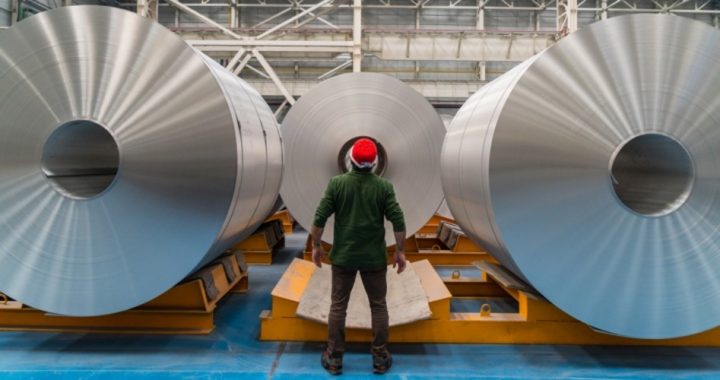
During a March 1 meeting that the White House described as a “Listening Session with Representatives from the Steel and Aluminum Industry,” President Trump announced that his administration was going to be instituting tariffs on imported steel and aluminum. When asked how long the tariffs would be imposed, Trump replied: “Unlimited period.” He then confirmed that the tariff would be “Twenty-five percent for steel. It will be 10 percent for aluminum. And it will be for a long period of time.”
David Burritt, president and chief executive officer of United States Steel and John Lapides, president of United Aluminum Corporation, were among the industry leaders attending the session. Trump addressed the steel and aluminum executives and explained why he was imposing the tariffs:
You’re all — pretty much all of you will immediately be expanding if we give you that level playing field, if we give you that help. And you’re going to hire more workers, and your workers are going to be very happy. They’re going to be very, very happy.
And again, what’s been allowed to go on for decades is disgraceful. It’s disgraceful. And when it comes to a time when our country can’t make aluminum and steel — and somebody said it before, and I will tell you, you almost don’t have much of a country. Because without steel and aluminum, your country is not the same. And we need it.
We need it even for defense, if you think. I mean, we need it for defense. We need great steelmakers, great aluminum makers for defense.
So we’ll probably see you sometime next week. We’ll be signing it in. And you will have protection for the first time in a long while, and you’re going to regrow your industries. That’s all I’m asking. You have to regrow your industries.
Trump’s statement was quickly met with negative reactions from some influential Republican members of Congress. Senator Lindsey Graham (R-S.C.), speaking on CBS’s Face the Nation on March 4, was critical of the planned tariffs. “You are letting China off the hook. You’re punishing the American consumer and our allies. You’re making a huge mistake here. Go after China, not the rest of the world,” Graham said.
House Speaker Paul Ryan also weighed in on Trump’s new tariffs during a news conference on Capitol Hill, held one day after Ryan’s spokeswoman AshLee Strong issued a statement on March 5 that the speaker was “extremely worried” about the president’s proposal.
The statement said that the speaker is “urging the White House to not advance with this plan. The new tax reform law has boosted the economy and we certainly don’t want to jeopardize those gains.”
During the March 6 news conference, Ryan acknowledged, “There is clearly abuse occurring, clearly there is overcapacity dumping in transshipping of steel and aluminum by some countries, particularly China, but I think the smarter way to go is to make it more surgical and more targeted.”
Ryan added that Trump’s plan was “more prone to retaliation,” but he is encouraged that the administration plans to “focus on what is clearly a legitimate problem and be more surgical in its approach so we can go after the true abuses without creating any unintended consequences or collateral damage.”
During the news conference, Ryan told reporters that Representative Kevin Brady (R-Texas), the Chairman of the House Ways and Means Committee, is taking the lead on talks to urge the administration in a different direction on the tariffs. Ryan said the caucus is “encouraged we can get to a good place.”
“We’ve had multiple conversations about this, [the president] knows our view. Every now and then we’re just going to have a different approach as to how we tackle these problems, but it should be acknowledged there is a problem that needs to be addressed here,” Ryan said. “We just want to make sure that it’s done in a prudent way.”
White House Press Secretary Sarah Huckabee Sanders spoke about Ryan’s statements with CBS News on March 5.
“We have a great relationship with Speaker Ryan,” said Sanders. “We’re going to continue to have one but that doesn’t mean we have to continue to agree on everything. The president has been committed and talked about this for many years.”
Conservative author and columnist Patrick J. Buchanan wrote about these alarmist reactions to Trump’s tariff plan in a column posted by The New American on March 6.
Buchanan began by providing a brief history lesson, noting that Republicans had supported protecting U.S. manufacturers by means of tariffs during thirteen GOP administrations from 1860 to 1930. In light of this lengthy record of Republican support for tariffs, Buchanan asked this question, “Why, then, this terror of tariffs that grips the GOP?”
The articled noted that the United States relied on tariffs to transform itself from an agricultural economy in 1800 into “the mightiest manufacturing power on earth by 1900.”
Buchanan continued by observing that since the first Bush administration, the United States has run $12 trillion in trade deficits, and, in the first decade in this century, we lost 55,000 factories and 6,000,000 manufacturing jobs. He attributed this disastrous economic scenario to the $4 trillion in trade surpluses China has run up at the expense of America.
Putting his advice into specifics, Buchanan wrote:
Specifically, we need to shift taxes off goods produced in the USA, and impose taxes on goods imported into the USA.
As we import nearly $2.5 trillion in goods, a tariff on imported goods, rising gradually to 20 percent, would initially produce $500 billion in revenue.
All that tariff revenue could be used to eliminate and replace all taxes on production inside the USA.
Trump’s tariff proposals should not come as a surprise to anyone who followed his statements during the 2016 presidential campaign, when he often blasted unfavorable trade deals that closed factories in the Rust Belt and put thousands of Americans out of work. It was largely because of these commitments that Trump did surprisingly well in states such as Michigan and Pennsylvania, where once-thriving U.S. auto-manufacturing plants and steel mills now sit idle. Even union leaders and Democratic lawmakers from Rust Belt states have praised the planned tariffs.
If Trump is successful in imposing his tariffs, the price of imported steel and aluminum and items made from those metals will increase, but this will give U.S.-made metal products a competitive advantage. In time, as the U.S. steel and aluminum mills go back into full production, providing thousands of jobs, the U.S. economy will reap the benefits. And this is exactly what Trump promised to do while running for president.
Photo: ozgurdonmaz via iStock / Getty Images Plus
Related article:




